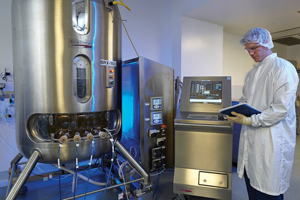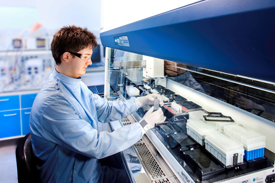FUJIFILM Diosynth Biotechnologies has an established and successful history of supplying both clinical and commercial cell culture derived human therapeutics.
The keys to developing biomanufacturing processes which are efficient, robust and of high quality start during cell line and process development and initial process design. This webinar will discuss how FUJIFILM Diosynth Biotechnologies’ cell line development and upstream process development platforms have been modified and optimized to develop customized, reliable manufacturing processes. This includes the introduction of a new mammalian expression platform, called Apollo™.
Topics presented will include:
- (i) the use of directed evolution approaches to develop host cell lines with improved growth and productivity characteristics;
- (ii) the use of state-of-the art screening strategies to enable better decisions on cell lines to progress;
- (iii) establishment of high performing basal and feed media strategies for both the Fujifilm Apollo™ CHO expression system and for diverse CHO cell lines coming from clients;
- (iv) targeting media, feeds, and process conditions to achieve desired cell culture performance (growth, titer) and monoclonal antibody (mAb) product quality optimization and control during process development, and scale up to manufacturing; and
- (v) leveraging well-proven single-use process platforms to streamline manufacturing operations and provide advantages in technology transfer via elegant process design.
For the development of host cell lines topic, data from the initial adaption of a CHO DG44 host cell line from serum containing to chemically-defined, protein-free media will be included. It will show how the subsequent use of an improved sub-culture regime during continuous culture of the cells allowed a reduction in doubling time from ~27 hours to ~21 hours. The directed evolution approaches that were then used to develop host cell lines with improved growth and productivity characteristics will be described. Such approaches are iterative and utilise the application of selective pressure to a system to identify variants with desirable characteristics. During a series of assessments, an initial 77 host cell lines identified were reduced down to 25, then 5 and finally 2. Some of the key data from these assessments, which included studying parameters such as growth and mAb expression capability, will be presented. Observations from the assessment of the 25 cell lines included identification of cell lines which achieved up to a 3-fold increase in mAb expression from transient transfection.
The state-of-the art screening strategies that will be presented are a fed-batch shaken multi-well plate system and the ambr15™ microbioreactor system. The advantage of using such screens, in that they are more predictive of cell line behaviour in a production process will be discussed. How the host cell line, cell line development strategy and the development of a new expression vector, have been brought together to form the new mammalian expression platform, Apollo™, will be highlighted.
Fujifilm has leveraged experience in cell culture basal and feed media development and existing vendor relationships to develop high performing basal and feed media systems for our Apollo™ CHO expression system. We will show how we leveraged the high throughput and advanced data analysis capabilities of our media vendors to develop basal and feed media that are specifically tailored for use with our CHO expression system.
In parallel with the Apollo™ innovation efforts over the last few years, Fujifilm has evaluated a multitude of basal and feed media to establish a collection of high performing media that can be applied to any client CHO cell line coming to us for process development. We term this our ‘Media and Feed Toolbox’. The Toolbox was developed by screening commercial and prototype basal and feed media with a diversity of CHO lines to identify a subset of best performing media available from our vendors. We will show how application of Toolbox media and feed screening studies lead to significant improvements in cell growth and product titer with potential benefits for product quality and manufacturing robustness.
Selection of high performing basal and feed media for a CHO cell line provides a solid foundation of balanced nutritional requirements upon which process conditions can be built. Fujfilm leverages over 15 years of experience in CHO process development (PD) to provide an early phase process development approach for cell culture programs. This early phase development approach uses our experience to only study parameters with the most process impact. Parameters such as pH, temperature or temperature shift, feed frequency and quantity, or seed density are typically studied, while mass transfer parameters (DO, pressure, agitation speed) are not studied because they are already clearly defined as part of our single-use process platform. As programs move to later clinical phases a more intense DOE based process optimization strategy is employed. This allows for the study of more parameters and their interactions to truly optimize a process before it goes to commercial supply, providing manufacturing robustness the best possible cost of goods.
An enabling factor for the streamlined PD approach is Fujifilm’s well proven single-use platform manufacturing platform. Fujifilm has developed single-use bioreactor (SUB) platforms for CHO and baculovirus expression systems that allow for process standardization and reliable scale-up to manufacturing. We will show agreement in SUB performance in comparison to stainless steel and will also show scalability of our SUB systems from the 10L lab scale to the 1,000L manufacturing scale along with description of our modelling approach. Comparability of process results between reactor scales, along with reproducibility at each scale, shows the scalability of the Fujfilm single-use process platforms.
The development of the Apollo™ CHO expression system, including high performing basal and feed media, and application of streamlined process development approaches allows for the development of high titer processes that exhibit robustness in growth and product quality. These innovations combined with our well proven single-use GMP manufacturing platforms allow Fujifilm to deliver customized, cost effective and reliable CHO based manufacturing processes to propel our clients through the key stages of clinical development.
Speakers

Alison Porter, PhD, Head of Mammalian Cell Culture R&D, FUJIFILM Diosynth Biotechnologies, Billingham, UK
Alison Porter joined FUJIFILM Diosynth Biotechnologies in 2011. She is currently Head of the Mammalian Cell Culture R&D Department, where she has recently led the development of the company’s new Apollo™ mammalian expression platform. Alison has considerable industrial experience in mammalian cell culture, specializing in the construction of recombinant cell lines, having spent two years at Bio Products Laboratory followed by 13 years in the Cell Culture Process Development group at Lonza prior to joining Fujifilm. Alison has a PhD in Biotechnology from the University of Manchester.

Stewart McNaull, PhD, Director, Development and Technical Services, FUJIFILM Diosynth Biotechnologes USA Inc.
Stewart McNaull has over 16 years of experience in bioPharmaceutical process development, tech transfer, manufacturing and new technology innovation; specializing in cell culture and microbial systems. He led the Upstream Process Development group at Fujifilm Diosynth Biotechnologies for six years with prior experience managing clinical and commercial program execution in GMP manufacturing. His experience includes leading CHO mAb and microbial tech transfer and scale-up efforts and providing commercial process engineering support. Stewart has been a key contributor to the evaluation of single-use technologies at both sites and has led the implementation of these technologies into GMP manufacturing. Currently, he is charged with designing and leveraging our innovation programs to offer new capabilities and services to our industry partners.
Who Should Attend?
R&D VPs, Directors, Managers and Department Heads of pharma and biotech companies who are responsible for cell line or process development, and/or manufacturing and looking to outsource development and manufacture of their biopharmaceutical products
Xtalks Partner
Fujifilm
FUJIFILM Diosynth Biotechnologies is an industry leading Biologics Contract Development and Manufacturing Organization with locations in USA and UK. With extensive experience in the development and manufacture of bioPharmaceuticals expressed in a wide array of systems, we offer a comprehensive list of services from cell line and strain development, including our proprietary pAVEway™ microbial and Apollo™ cell line systems, to process development, analytical development, clinical and commercial manufacturing. Both sites are FDA-approved for the production of commercial products. Through a strategic alliance with Piramal Healthcare we offer development and production of Antibody Drug Conjugates and over the last two years have significantly expanded our cGMP cell culture manufacturing capacity.
Media Partner
You Must Login To Register for this Free Webinar
Already have an account? LOGIN HERE. If you don’t have an account you need to create a free account.
Create Account

